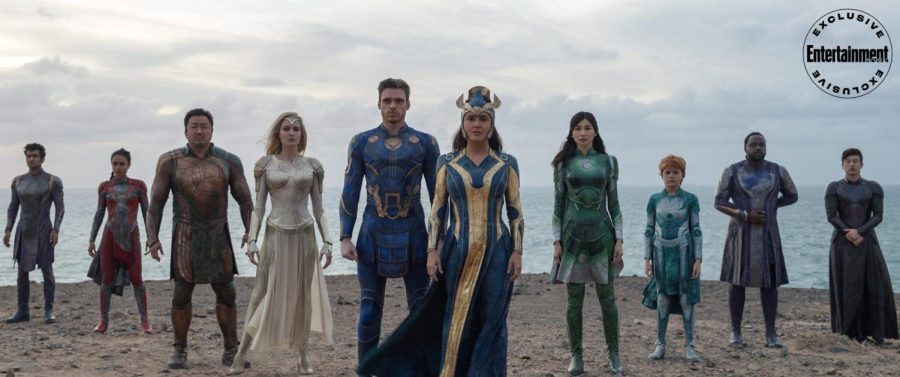Since early childhood, Jake’s grandfather Abe regaled him with fantastical tales of his adolescence spent battling massive, tentacled monsters and living at “Miss Peregrine’s Home for Peculiar Children,” where his peers included, among others, Emma, a girl as light as air; Olive, who could set things on fire with a brush of her bare hand; Millard, an invisible boy; and Claire, with huge, chomping jaws concealed under her delicate blond curls.
Alas, Jake’s dad soon convinces the boy that his grandfather’s stories are naught but a coping mechanism to deal with tragic reality: the “monsters” Abe supposedly fought were actually German soldiers, Jake’s dad insists. Soon after Abe left the orphanage he grew up in for the army during WWII, it was bombed by the Germans, killing the children and headmistress he knew as family. After years of believing in the reality of Emma, Olive, and the others, Jake quietly tells his grandfather he no longer does, and returns Abe’s gift from years prior: a box of photographs depicting Miss Peregrine and the Peculiar Children.
A few years later, Jake finds his grandfather supine and bloody in the woods with his eyeballs missing, the trees shaking and a fleeting glimpse of an eyeless, tentacle monster. “I should have told you years ago,” Abe chokes out, and begs Jake to seek out “the bird, the loop, and September 3, 1943.” Miss Peregrine, he insists, is not dead and will explain everything.
In counseling for the trauma of finding his mutilated grandfather, a psychologist is quick to support the notion of Jake’s taking a trip to Wales with his father, to try and find Abe’s orphanage in order to get some closure on his passing; they arrive only for Jake to find it in ivied ruins, the roof missing and the interior blown apart by a German bomb decades earlier.
Despondent, Jake pokes through the home’s charred remains and is terrified to find himself surrounded by Emma, Olive and several of the other children — all very much alive and wanting him to return with them to Miss Peregrine. Curiosity overcomes the boy, and he joins them as they travel back in time to Sept. 3, 1943: the day the home was bombed, and the day Miss Peregrine and the children have been living in a loop, created by the headmistress herself, ever since.
Thus begins “Miss Peregrine’s Home for Peculiar Children,” the latest film by Tim Burton, a director who is legendary in his penchant for the peculiar. Based on the 2011 book by Ransom Riggs, “Miss Peregrine” delivers the visual beauty, unmistakable characters and dose of weirdness we have come to expect from Burton films. His signature is evident from beginning to end here — the opening scenes in Abe’s neighborhood, set in Tampa Bay, Florida, evoke strong memories of the suburban neighborhood setting in “Edward Scissorhands” (1990), while Abe’s passion for telling his seemingly fantastical stories as factual accounts to young Jake reminds us of Edward Bloom’s tales in “Big Fish” (2003).
While visually appealing enough in the beginning, the scenes post Jake’s arrival at the Home are absolute eye candy, with flawless set design on the grounds and interior of the home, beautiful costuming and makeup on Miss Peregrine and the children, and a stunning underwater scene inside a wrecked ship. From muggy Florida to misty Wales, a powerful sense of place is evident in each set location.
Burton makes an exceptionally good choice in casting Eva Green as the unforgettable Miss Peregrine. Previously seen in Burton’s “Dark Shadows” (2012), Green embodies the whip-smart, pipe-smoking manipulator of time with crisp and brilliance. Her every moment onscreen is infused with unabating energy and presence, and her avian grace makes her ability to shapeshift into a peregrine falcon fully believable. While Miss Peregrine keeps high standards for her charges and runs a tight ship in the home, she is well balanced with obvious affection and sacrificial love for the children. Green’s striking, memorable work in this role will, hopefully, ensure her a place in future Burton films, as the work of Johnny Depp and Helena Bonham Carter has done for them.
In contrast, Asa Butterfield’s work as Jake couldn’t be more blasé. Personally, I’m still having a difficult time discerning whether Butterfield simply isn’t a talented actor or if the character of Jake is actually intended to be so uninteresting. Perhaps the latter is the case, or perhaps Butterfield’s mediocrity just becomes painfully apparent when seen alongside the rest of the mostly excellent actors in the film.
Ah, and now to the romance: the unnecessary, chemistry-free, uninspiring and absolutely predictable romance between Jake and the light-as-air Emma. This is no spoiler; unless you’ve never watched a movie with teenagers as the main characters, we all know it’s going to happen the minute they meet. I shouldn’t be too frustrated at the inclusion of such an annoyingly predictable event, but I do take issue with the absent chemistry between the two. If a teen romance was really so essential to the film, at least it could have been more interesting to watch.
While the film’s good qualities shouldn’t be discounted, viewers seeking a shocking or unexpected film experience shouldn’t go into “Miss Peregrine” with high hopes. It is beautiful, but the storyline features little that could be considered new or overly exciting, not the least of which is yet another mostly white cast. Given that the film is set primarily in Wales, the lack of racial diversity among the cast is regrettable, though not terribly surprising at first. However, when noted in the context of a recent interview Tim Burton gave to Bustle, it becomes problematic. In response to queries on the reasons for his predominantly white cast in “Miss Peregrine,” (and all his previous films), Burton said that while lack of diversity is becoming an issue of concern in Hollywood, “things either call for things, or they don’t.”
Burton’s statement seems to reflect an attitude that sees the inclusion of nonwhite actors in his cast as a task to be carried out under special circumstances only. Thus, his choice of African-American actor Samuel L. Jackson as the main villain in “Miss Peregrine” is more than a little unsettling. Samuel L. Jackson is the first black actor to play a main role in a Burton film, and while Barron’s character is an excellent role to which he brings all his brilliance, it stings to realize that, in Burton’s mind, only the villainous role “called for” a black actor.








